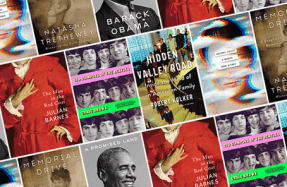Ben Marcus: Writer’s Block Happens When I’m Boring

Ben Marcus’s Notes From the Fog is out now.
*
How do you tackle writer’s block?
Writer’s block, if that’s the name for it, happens when I am boring, when my mind is flat, when I have nothing to add to what has been said and done. Therefore it happens nearly all of the time. It happens when writing is an obligation and not a desire. And I really don’t mind. It’s not clear that I am meant to pump out writing at all costs. The opposite is true. The world will be just fine without anything I might write. Writing is not exactly a scarce resource. There is far too much out there that hasn’t been read enough. So I don’t try to solve this silence. To me it is necessary.
It is exhausting to be obsessed and driven and full of some pressing need to write—and it doesn’t happen very often. I also don’t write so sharply if I don’t care about what I’m doing, and caring is hard to fake. So, to me, writer’s block is a sign that I probably ultimately don’t give enough of a shit. This is my own flaw. I should care about more than I do. Or what I care about doesn’t fit so obviously inside the boundaries of what I consider fiction. Part of the beginning of any project is the discovery of what matters to me, followed by an attempt to conceive of it in terms of fiction. That’s what it is to start a project: engineering a set of delusions that the act of writing has consequence and simply must be done. When I’ve finished, it’s hard to believe that I ever could have cared so much, but I did, for a little while, and then it’s time to hunt down something new to care about and to hope that I have the ability to make it exist in fiction.
What was the first book you fell in love with?
I don’t remember my childhood very well. Perhaps that’s for the best. I remember stacks of books, sitting with books, reading books, being read to. But a bit later on, I read a book called I Am the Cheese, by Robert Cormier, and it was unnerving. I didn’t really understand it. It disrupted my reality and it also showed me how deliciously deranging and powerful a story could be. For a long time I was afraid to reread it, because I didn’t want to understand it as an adult. I think I loved it because it lurked just outside of my ability to comprehend the story, but it was close enough that I obsessed over it.
Which book(s) do you return to again and again?
Lately this would be The Visiting Privilege, by Joy Williams. It’s an overwhelming display of virtuosity at the short story, but it’s also a merciless, unflinching view of life among people. It confronts the hardest questions but preserves enigma and doubt and stunned wonder. I read her to be reminded that the short story can have the crushing impact of philosophy, prophecy, and sermon.
What time of day do you write?
Morning, morning, morning, morning. Ordinary thinking overcomes me the longer I am awake.






